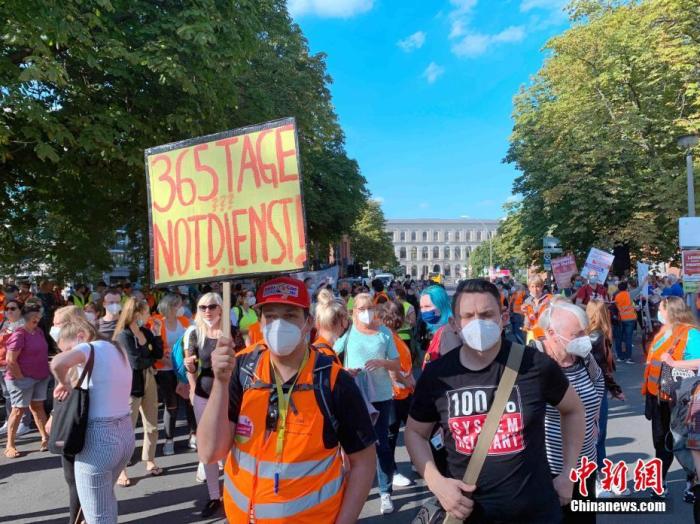(Fighting New Coronary Pneumonia) The German Covid-19 Accumulatively Diagnosed Over 4.3 Million Will Cancel Free Testing
China News Agency, Berlin, October 10 (Reporter Peng Dawei) According to the new crown epidemic data released by the German disease control agency on the 9th, as of that day, the cumulative number of people diagnosed with the new crown virus in Germany has exceeded 4.3 million.
Starting from October 11th, German officials will cancel the current free rapid antigen test once a day for the entire population, in order to encourage those who have not yet been vaccinated to get vaccinated.
On September 14, local time, more than 1,000 medical staff from the two major medical groups in Berlin, Fevantes and Charité, went on strike due to their dissatisfaction with the heavy workload.
Photo by China News Agency reporter Peng Dawei
According to data released by the Robert Koch Institute, the German disease control agency, on the 9th, 8854 people were newly diagnosed and 65 people died in Germany. A total of 4.302 million were diagnosed and 94,178 people died.
The two main indicators used by the German authorities to monitor the severity of the epidemic, "the average number of newly diagnosed patients per 100,000 people in seven days" and "the average number of severely ill patients per 100,000 people in seven days" rose slightly to 64.4 and 1.67 on the same day.
As of that day, Germany has received 109 million doses of vaccines, and 54.234 million people have been fully vaccinated, accounting for 65.2% of the country's total population.
According to official German news, the country will no longer provide domestic residents with a free antigen test service at most once a day from October 11.
In the future, only a small number of people who are unable to get the vaccine due to physical reasons or who have not been given the opportunity to get a vaccination will be able to get free testing with relevant certificates.
According to officials, the starting point of this arrangement is to encourage more people to take the initiative to vaccinate and help Germany to smoothly survive the new wave of possible large-scale outbreaks in autumn and winter, but this approach has also attracted criticism.
The German Social Security Union (VdK) stated that the government should set an upper limit for the price of testing items that will resume fees after the 11th, to avoid the recurrence of the problem of excessive testing fees at the beginning of the epidemic last year.
The German social group "Equality Charity Association" criticized that the cancellation of free quick inspections may cause vaccine skeptics with ample economic conditions to actually have a "privilege", thereby creating new inequalities.
The agency believes that the correct approach should be to strengthen scientific work on the necessity of vaccination.
As Germany is currently in the post-election negotiation stage of cabinet formation, the originally regular consultations on epidemic prevention policies between the federal government and the states have been suspended for a long time.
In this regard, Lauterbach, a public health expert from the German Social Democratic Party on the 9th, called on the two sides to hold consultations as soon as possible to discuss and decide on issues such as tightening of epidemic prevention measures in autumn and winter, and intensified vaccination.
(over)

